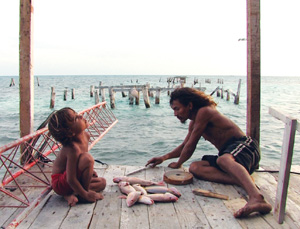EVEN WITHOUT the explanatory title at the end of the film, it’s clear that the Banco Chinchorro—site of the film Alamar—is one of the rarest places on Earth.
Already a marine sanctuary, this system of reefs and atolls between Belize and Quintana Roo is being selected for an even more heavily protected status by the U.N. If the BP depredation hasn’t given you an irresistible longing to go see some of the world’s reefs before they’re doomed, Alamar will make that feeling more urgent.
A picturesque setting isn’t enough to make a movie. In its elegantly simple and indirect way, unrehearsed and free of artificiality, director Pedro González-Rubio follows three generations during a brief vacation in one of the fishing shacks built into the water.
We have no narrative to suggest it—this movie is for people who like to guess—but these cabins on stilts are perhaps built to circumvent the law (and thank God there is a law) against building on the flat, driftwood- and crab-covered islands nearby. In one of these 12-by-12 wooden boxes in the water, the cast, González-Rubio and his soundman—five men in total—stayed and watched the horizon and filmed the ocean from both above and below.
The handsome, shaggy-haired Jorge Machado and the more than merely adorable Natan Machado Palombini, real-life father and 5-year-old son, play a family reunited after some years. Natan lives in Italy with his mother and has come out to visit his dad and his grandfather Nestór (Nestór Martin), a lifelong fisherman with mahogany skin and a white brushy mustache. Both Jorge and Nestór live on the remote coast of Mexico.
The visit leads to a long and successful fishing trip. We watch the passing down of skills from grandfather to father to son, as they boat out through seascapes of a profound and deep blue, snorkeling for langoustas, spearfishing or putting out a poleless line for barracudas. They bring their boat to shore only to scrub its hull with white sand, get a few supplies and chat with the other fishermen—hence one mysterious moment, with a toothless old fellow reciting a love poem to the camera.
Most directors would be tempted to create pumped-up opportunities for conflict and resolution. Here, the disharmonies between Jorge and Nestór don’t get more serious than a debate over the question of how strong coffee ought to be; the old man, like so many Mexicans, is a Nescafe drinker; Jorge’s time in Italy is signaled by the presence of a tiny espresso pot. Similarly, the only flare-up between Jorge and his son is a brief moment of impatience when the kid snarls some fishing line.
Old Nestór insists on his happiness here at this edge of the world. He tells us “Fishing is about luck and patience,” which is also what film directing is about. Somewhere along the line Jorge must have been educated, which might have been how he met a European girl (we see him in Rome in home-movie pre-titles). He knows the Latin names for the flora and fauna, and also how to help tame a lovely white cattle egret that waddles in for some free food.
Some moments foretell the loss to come: on the day when Natan is going return across the Atlantic, Jorge is glimpsed, bent over the hammock, sleeping with his head across the chest of his son. Alamar is a beautiful, brief movie that reminds one somewhat of Carroll Ballard’s visions of nature, though it surpasses them even for quietness and tenderness. It’s an unforced, languorous look at a water world, free of overcooked narrative and resplendent with tropical skies under which every day, and every scene, is a fresh start.
Alamar
(Unrated; 73 min.)
Opens Aug. 6 @ Camera 7, Campbell




